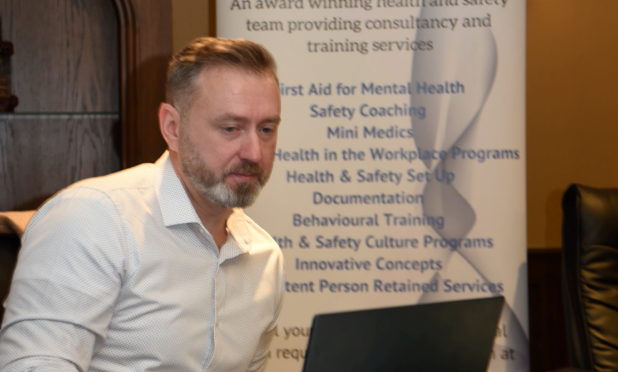With stress, depression and anxiety affecting 602,000 workers across the UK in 2019, Rebekah McVey decided to find out how mental health first aid training can help
Despite mental health gaining a bit more prominence in the last year or two, it is still a subject that is difficult for many people to talk about.
Increasingly however, workplaces are trying to break down those barriers and equip staff with the skills to help those who may be struggling.
According to an HSE report published last year, 12.8 million working days are lost due to work-related stress, depression or anxiety.
It affects 602,000 workers, with those in public administration and defence roles suffering the most.
At Aberdeenshire Council, 114 employees have enrolled for an internal mental health first aid training course – with 38 completing it between November 2018 and June 2019.
Aberdeen City Council, meanwhile, provided 12 employees with training last October.
Among those to complete their training is Hazlehead and Queen’s Cross councillor Claire Imrie, who has achieved her level two certificate and believes it to be worthwhile.
Mrs Imrie, who is now the council’s mental health spokeswoman, said: “The reason I chose to do this course was because I have dealt with many constituents who are directly or indirectly effected by some form of mental health. I have spoken to many people in Aberdeen involved in services, charities or groups that help others but for me to now how to recognise these signs I believe is important.
“Within oil and gas, I was heavily involved in human factors and mental health, although back then it wasn’t really recognised as something we need to focus on, now thankfully it is.”
Indeed, the boss the Omniscient Safety Innovations (OSI) – who delivers training sessions – believes everyone has a responsibility to be able to help a colleague struggling with a mental health problem.
At one training session, there are 15 people from varied fields settling down for the day-long tutorial.
Director of OSI, Brett Townsley said: “Mental health first aid is important because mental health issues can affect anyone at anytime.
“The mind is just one other part of the human body, it can be injured or affected by illness.
“Anyone can complete mental health training first aid training regardless of what industry they work in.”
The session involves attendees learning more about various conditions, such as depression, anxiety, psychosis and eating disorders.
Some of those taking part work towards level one, which provides a foundation to build more knowledge on. The idea is not to be a therapist, but to be aware of certain warning signs and to be better educated on certain issues.
However, if a person is at crisis point, the training advises contacting the emergency services.
One of those taking part, who achieved both his level one and two training, said: “I wanted to do mental health first aid training to have the tools to be able to have effective conversations with colleagues who might need it at work.”
Councillor for Inverurie and District, Neil Ballie who is also a support worker for Inspire said: “Anything that adds to the conversation about mental health is worthwhile.
“When talking to people about their mental health it’s important not to talk down to them and speak to them on a level peg.”
According to FOI figures obtained by the P&J, 114 employees of Aberdeenshire Council enrolled for an internal first aid training course. Completion dates were November 2018 and June 2019.
The local authority also has a mental health first aid group where an additional five employees have been certified at an external course.
In comparison another FOI revealed that Aberdeen City Council provided 12 employees with mental health first aid training. This was done on October 15 and 16 2019.
